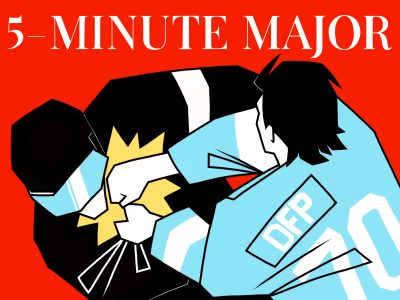The Las Vegas Golden Knights did what no one thought they could do at the trade deadline.

They were buyers. And they bought a lot.
The reigning Stanley Cup champions looked like they were going to make the playoffs yet again, having only missed one season since their inception in 2017.
Apparently, the wild card wasn’t going to be good enough for them. They wanted to repeat.
The Knights made their first trade with the Washington Capitals for Anthony Mantha, who only cost a 2024 second-round pick and a 2026 fourth-round pick.
Mantha has hardly been able to make it through an entire season in his career, but before getting traded, he was sitting on 34 points in 56 games, including 20 goals. Since joining the Knights, he has continued to contribute offensively, racking up 10 points in 18 games.
Only two days later, the Knights struck again in a three-team trade that brought them defenseman Noah Hanifin from the Calgary Flames.
Hanifin was spending an average of 23:46 on the ice before getting traded, and he was contributing offensively as well, with 35 points for the Flames. Since moving to Vegas, he has 12 points in his 19 games.
Neither of those were the Knights’ biggest trade of the deadline.
Center Tomas Hertl, who had spent the better part of the last 11 seasons with the San Jose Sharks, was traded to the Knights along with a couple third-round draft picks for a forward and a 2025 first-round pick, a pick that is not likely to be very high in the draft considering the repeated success of the Knights.
Not only did the return seem light for the Sharks’ only All-Star, but they were taking a player who was in his second year of an eight-year contract and was likely planning to spend his entire career in the organization that drafted him.
Hertl hadn’t played since late January before he was traded, so the Knights weren’t trading for immediate impact. However, he was able to make his Vegas debut against the Vancouver Canucks last week. He got his first point in the gray and gold in that first game.
There was a reason no one thought the Knights would be buyers to this extent.
The salary cap.
The deadline added almost $11 million to the Knights’ payroll.
The NHL salary cap is $83.5 million. The deadline alone took more than 13% of the allowed spending for Vegas. They have another 20 players they have to pay.
So they aren’t going to have captain Mark Stone on the payroll.
Stone has a lacerated spleen, an injury he sustained on Feb. 20. It’s a real injury. The Knights placed him on the long-term injured reserve, or LTIR, four days before the trade deadline. The timing seems weird, especially knowing that putting a player on the LTIR exempts the player’s salary from the cap.
And it looks like he’ll be ready in time for the playoffs.
Convenient.
The Stanley Cup Playoff rosters do not count against the salary cap. So the team could put whoever they want on the LTIR and get them ready in time for the playoffs, where there is no maximum budget for players’ salaries.
This isn’t even the first time this has happened. The Tampa Bay Lightning placed star forward Nikita Kucherov on the LTIR in the 2020-21 season, alleviating any cap pressure on the team and rejoining the team less than three months after hip surgery, right in time for the playoffs. The Lightning went on to win the Stanley Cup, and Kucherov got to hoist the cup himself on the ice alongside the rest of his team.
Even though it’s technically legal — the NHL can’t force players to prove the severity of their injuries or their recovery timelines for a myriad of reasons — it feels a bit icky.
It’s a loophole, and it feels like cheating.
This loophole allows teams to have … convenient injuries in order to stock up on players on the deadline without further consequence, only to just get better for the playoffs.
People should be able to watch the best players throughout the season if they’re healthy.
Besides, having a salary cap remain in place through the playoffs could even the playing field a little more without teams’ best players suddenly once again being able to contribute out of nowhere. No one would complain about a little extra spice in the most exciting part of the season. For the impartial fan, no steamrolling is fun.
Just because it isn’t technically cheating, doesn’t mean it can’t feel like cheating — and no one likes cheaters.






















































































































david foley • May 4, 2024 at 10:49 am
amen! i agree